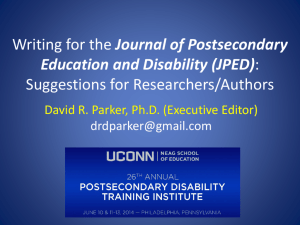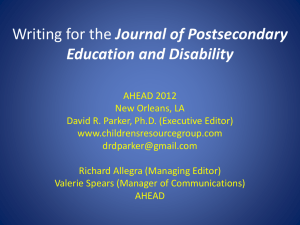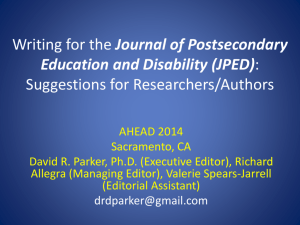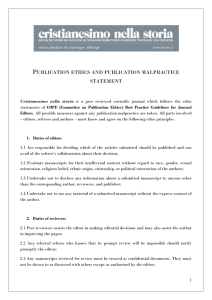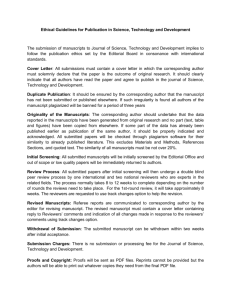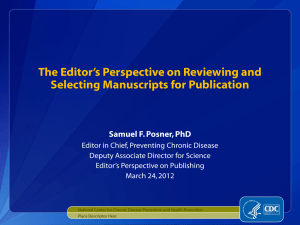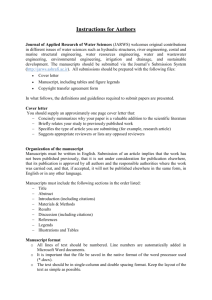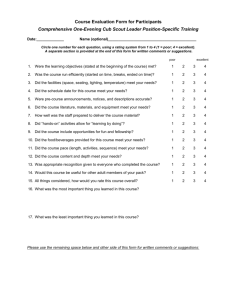4.12 Writing for JPED Outline
advertisement
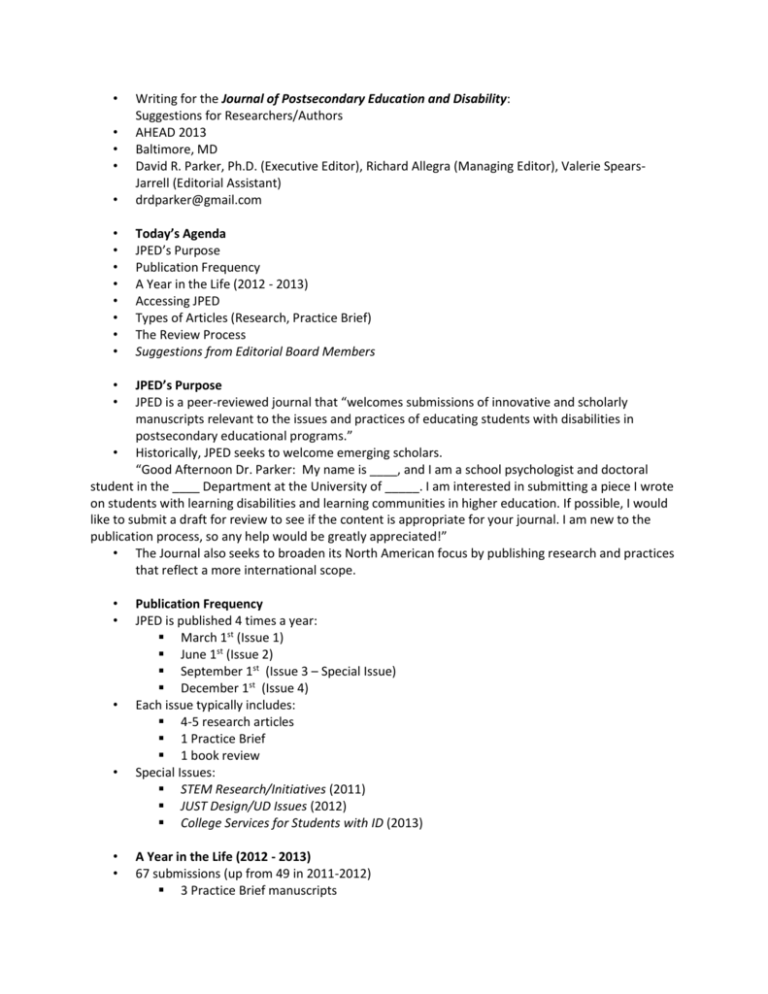
• • Writing for the Journal of Postsecondary Education and Disability: Suggestions for Researchers/Authors AHEAD 2013 Baltimore, MD David R. Parker, Ph.D. (Executive Editor), Richard Allegra (Managing Editor), Valerie SpearsJarrell (Editorial Assistant) drdparker@gmail.com • • • • • • • • Today’s Agenda JPED’s Purpose Publication Frequency A Year in the Life (2012 - 2013) Accessing JPED Types of Articles (Research, Practice Brief) The Review Process Suggestions from Editorial Board Members • • • • • JPED’s Purpose JPED is a peer-reviewed journal that “welcomes submissions of innovative and scholarly manuscripts relevant to the issues and practices of educating students with disabilities in postsecondary educational programs.” • Historically, JPED seeks to welcome emerging scholars. “Good Afternoon Dr. Parker: My name is ____, and I am a school psychologist and doctoral student in the ____ Department at the University of _____. I am interested in submitting a piece I wrote on students with learning disabilities and learning communities in higher education. If possible, I would like to submit a draft for review to see if the content is appropriate for your journal. I am new to the publication process, so any help would be greatly appreciated!” • The Journal also seeks to broaden its North American focus by publishing research and practices that reflect a more international scope. • • • • • • Publication Frequency JPED is published 4 times a year: March 1st (Issue 1) June 1st (Issue 2) September 1st (Issue 3 – Special Issue) December 1st (Issue 4) Each issue typically includes: 4-5 research articles 1 Practice Brief 1 book review Special Issues: STEM Research/Initiatives (2011) JUST Design/UD Issues (2012) College Services for Students with ID (2013) A Year in the Life (2012 - 2013) 67 submissions (up from 49 in 2011-2012) 3 Practice Brief manuscripts • • • 64 Research/Policy manuscripts 4 returned to author; 11 rejected; 24 published/in-press; 9 being revised; 19 under review 6 non-U.S. manuscripts (2 Canada, Ireland, Italy, Israel, Australia) “Dear Dr. Parker - My colleagues and I are delighted that our manuscript will be published next March. We appreciate your astute editing support and know that we have had a better product after having incorporated the reviewers’ suggestions.” • • Accessing JPED The Journal continues to be provided as a benefit of membership. Switch to universallyaccessible formats in Fall 2010, including: DAISY, text, mp3 audio, and PDF versions text mp3 audio PDF * Printed version available for small additional fee • JPED is searchable through ERIC online and libraries that subscribe to the EBSCO "Education Research Complete" database. • Newly-organized back issues of all JPEDs are available: http://www.ahead.org/publications/jped • • • • • • • • • • • • • Article 1 - Research Articles Research: Original quantitative, qualitative, or mixed-method research (25 – 35 pages) Integration: Integrate research of others, compare/contrast theories, critique results, and/or provide context for future exploration Innovation: Propose new theory, approach, or service delivery model based on review of research/literature Policy Analysis: Analyze, critique, or present implications of public policy, statutes, regulation, and litigation Recent Research Articles Preparing for the Future IT Era: Perceptions of Students with Disabilities about IT Training in South Korea • Dongil Kim, Jiyoung Son, Mary Lee Vance (25/4) Cognitive Diversity and the Design of Classroom Tests for All Learners • Erin Shinn, Nicole S. Ofiesh (25/3) The Forgotten: Formal Assessment of the Adult Writer • Daniel J. McNair, Toi L. Curry (26/1) Financial Barriers for Students with Non-apparent Disabilities within Canadian Postsecondary Education • Tony Chambers, Melissa Bolton, Mahadeo A. Sukhai (26/1) DSS and Accommodations in Higher Education: Perceptions of Students with Psychological Disabilities • Kathleen F. Stein (26/2) Article 2 - Practice Briefs Practical strategies and programs used to support postsecondary students with disabilities. Limit the Body to 12 pages (including separate title page, abstract, and references). Tables/figures may be added beyond the 12 page limit. • • • • • • • • • • Title page Abstract Literature Review Depiction of the Problem Participant Demographics/Institutional Partners or Resources Description of Practice Observed Outcomes Implications/Portability References Tables and Figures (if needed) • • Recent Practice Briefs Project LINC: Supporting Lecturers and Adjunct Instructors in Foreign Language Classrooms • Sally S. Scott, Wade Edwards (25/3) Modeling Positive Behaviors for Postsecondary Students with Autism/Asperger’s: The Use of “Television Coaching” • Jack Trammell Examination Accommodations for Students with Sensory Defensiveness • Kieran Lewis, Clodagh Nolan (26/2) b-Learning in a Distance Learning Graduate Program for Deaf Students • Jose Reis Lagarto, Ana Mineiro, Joana Pereira (26/1) • • • • 1) 2) 3) 4) The Review Process Send manuscript (Word document) and cover email to jped@ahead.org. Managing Editor (Richard Allegra) confirms receipt; posts on JPED server. Executive Editor (David Parker) determines if manuscript should be reviewed. Two reviewers conduct “blind” review. a. Recommendation (publish?) b. Areas of weakness (Literature review; Relevance; Methodology; Findings supported by data; APA formatting; etc.) c. Comments/suggestions • The Review Process 5) Editor shares decision with lead author via email (Reject, Revise/resubmit, Accept with minor editing, Accept as is). a. Synthesis of reviewers’ comments b. Highlight the most important areas of feedback; additional suggestions * Do not take comments personally. Feedback generally implies an interest in publication or can help you publish in another journal. a. Deadline for receiving revised copy 6) Editor may send revised version back to reviewers; offers his own editing suggestions. 7) After acceptance, Valerie Spears requests bio and Permission Form from authors. 8) Valerie proofreads/checks APA formatting and sends galley proof to lead author. • Suggestions from Reviewers • Recommendations from the experts • Q&A Session Thank you for your interest in writing for JPED.
